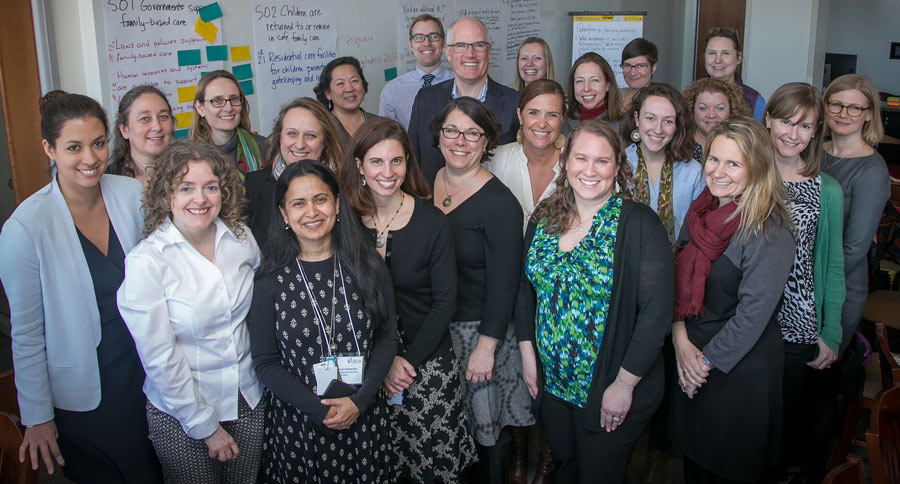The Problem
Globally, millions of children live in orphanages. Research shows 80-90 percent have a living parent, many of whom would prefer to care for their children if they had the resources to do so. Children are placed in orphanages primarily because of poverty and their families’ inability to access basic services such as education or specialized assistance for children with disabilities. Research demonstrates that residential care has a negative impact on children’s cognitive, physical, emotional, and intellectual development. In addition, well-meaning people donate millions of dollars to orphanages, while funds spent on orphanages could support integration of ten times as many children into families and achieve better results.
100&Change gave us the unique opportunity to shine a spotlight on the orphanage industry and draw attention to the needs of children who are too often invisible to the world.
The Solution
Catholic Relief Services, in partnership with Lumos and Maestral International, will change the way society cares for these children by reuniting them with supportive and nurturing families and transforming orphanages into family service providers. The partnership will prevent or slow down the number of new children entering residential care and strengthen families and caregivers so institutionalized children can be reintegrated into family care. Changing the Way We Care also intends to work closely with facility staff to identify and develop social service skills and outreach required to support children and families so they can stay together.
With the aim of taking this solution globally, Changing the Way We Care will first work with governments, community leaders, and orphanage staff in seven developing countries to identify the best family-based option for each child, provide families with parenting skills and services, and help policymakers craft better policies that support family-based care. Changing the Way We Care will then use evidence from these seven demonstration countries to influence other countries, regional political bodies and funders to build global momentum and to redirect donations and resources to serve vulnerable children in a way that supports family-based care.
What's Changed
The team made the following changes to its proposal since it was first submitted in October of 2016, informed by additional research, project development, and authentic engagement with communities of interest—defined as beneficiaries, those who might suffer harm, other funders, and competitors.
- Identified seven demonstration countries: Guatemala, Haiti, India (Odisha), Indonesia (Central Java), Kenya, Lebanon, and Moldova. These countries are regionally diverse, represent different income levels and a range of factors that affect placement of children into care (disability, HIV/AIDS, refugee status) and meet the following criteria: government commitment to family/community care over orphanages, active civil society engagement, availability of services to support prevention/reintegration, experience and/or presence of CRS, Lumos and Maestral, and likelihood of regional influence.
- Documented community engagement with policy makers, funders of orphanages, orphanage staff, parents who have institutionalized children, and "care leavers" (individuals who were once in institutional care and have left for a variety of reasons). Also engaged widely with non-governmental organizations, multi-lateral and bi-lateral organizations, faith communities, academics and the private sector.
- Proposed the creation of a seven-country network of "care leavers." This group will contribute to deliberations and decisions of governments and stakeholders in how best to care for children in family settings.
- Incorporated approaches to meet specific challenges for children with disabilities and other children with special needs.
About Our Team

Changing the Way We Care has engaged a broad alliance around this solvable problem, including governments, orphanage directors, researchers, philanthropists, individual and institutional donors, faith leaders, private sector actors and, most importantly, parents, caregivers, and individuals who grew up in orphanages.
Dr Shannon Senefeld, Senior Vice President, Overseas Operations, CRS
Philip Goldman, Founder and President, Maestral International
Georgette Mulheir, Chief Executive, Lumos
Caroline Bishop, Senior Technical Advisor for Vulnerable Children, CRS
Fenny Mwamuye, 4Children Project Director, CRS Kenya
Vijayalakshmi Arora, Head of Programming, CRS India
Kelley Bunkers, Technical Director for Child Welfare and Protection Systems, Maestral International
Dr Domnica Ginu, Acting Country Director, Lumos Moldova
More Information
View statement about $15 million grant ›
View the Catholic Relief Services project website ›
Project Contact
Hilary O’Connor, Senior Program Officer, Foundations and Corporate Engagement, Catholic Relief Services
Facebook: @CatholicReliefServices, lumos.at.work, MaestralInternational
Twitter: @catholicrelief, @CRSnews, @crs_expertise, lumos, MaestralIntl
YouTube: @CatholicRelief
Related Reading
Children, Orphanages, and Families: A Summary of Research to Help Guide Faith-Based Action
Faith to Action Initiative
Moving Forward: Implementing the 'Guidelines for the Alternative Care of Children'
Centre for Excellence for Looked After Children in Scotland
The Situation for Children Without Parental Care and Strategies for Policy Change
Wiley Online Library
The Finalists Live Presentation






